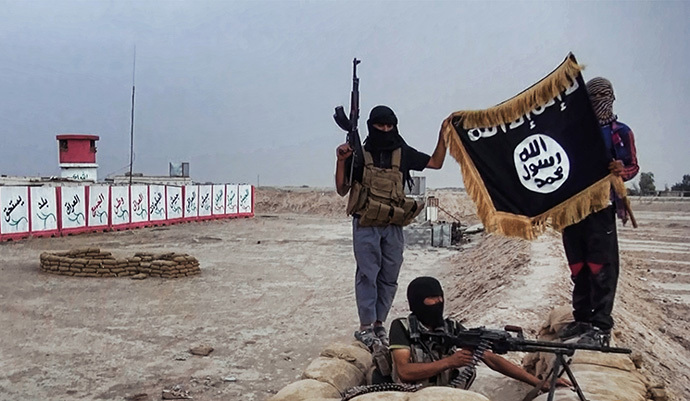Peter Holslin eats goat meat on nights and weekends
I still remember the day I saw Choubi Choubi! in the record store. I was flipping through CDs in the world-music section at a spot on Bedford Avenue in Williamsburg. Suddenly I came upon a colorful drawing of a middle-aged woman. She was smiling at me. Her eyes were rendered in black and white, but they were big and full of life. The title said Folk & Pop Sounds From Iraq. She was holding out a telephone handset, one of those old-fashioned models that people used in the ’80s—offering, it seemed, to set me up with a long-distance connection to a country some 6,000 miles away.
“Hey,” I said, turning to the clerk who was stocking inventory on a step-ladder next to me. “Do you know anything about this?” The clerk was of medium build, out of shape. He had an unkempt beard, with stringy brown hairs creeping across his cheeks. He glanced down and dismissed the disc with a surly grunt. “It sounds like somebody turning on a tape recorder and sticking their hand out a car window.” I frowned, then looked on the back for a tracklist. There wasn’t any… it’s not like I would’ve recognized the artists’ names anyway. Whatever. I handed the man 15 bucks.
I really wanted to answer that phone.
Iraq was haunting me. Everywhere I went, I imagined the carnage. The suicide bombings, the electric shocks, the massacres and kidnappings, all stemming from the invasion by my own government. It was the fall of 2006, and I was a college undergrad. My biggest mentor was Lorraine Adams, a Red Bull-guzzling, Pulitzer Prize-winning, ex-Washington Post investigative reporter-turned-college professor whose intermediate nonfiction-writing course included readings on terrorist groups like Aum Shinrikyo and Islamic Jihad. She ran a class of 18 at a funky liberal arts college in NYC; my classmates and I were as committed as a small militia. “Get out your readings,” Lorraine would bark, and we’d snap open our course readers in perfect synchronicity, like we were presenting arms in a morning drill.
Lorraine taught me how to write, but she also schooled me on how fucked everything was. The Bush Administration was torturing detainees and calling it “enhanced interrogation.” The Iraq War was spiraling into a devastating quagmire thanks to the U.S. government’s callous bumbling. I went into college as a happy-go-lucky kid who liked indie-rock and cyberpunk, but I was turning into a warrior-journalist. I followed the daily death tallies and New York Times reports with morbid diligence. I started blogging about obscure Iraqi parliamentary figures. As the months dragged on, things got intense. I had a dream about a neocon policy wonk. Passing by the empty lot near by Bushwick apartment, I pictured it as a dumping site for Shiite death squads. Sometimes, I’d imagine seeing anguish and horror in happy peoples’ eyes.
Other college kids were partying and getting laid. I was reading articles full of passages like this:
“Yasser, a tired-looking young man with a kaffiyeh wrapped around his neck, told me he was arrested, along with his 73-year-old father, by the Iraqi National Guard. “They said, ‘You are a Palestinian terrorist’ and ‘You foreign Arabs, you destroyed us,’ ” Yasser told me. He and his father were imprisoned for 16 days and tortured with electricity. Yasser told me his nails were torn out. Then, he said, his father was electrocuted to death in front of him. “We paid to get my father’s body,” he said as he wept in the tent, “but they gave me the wrong body.” The Iraqi National Guardsmen gave him 24 hours to leave Iraq. The other men stared down silently as he sobbed. “All I want to know is where my father’s body is.”
I needed a break from the carnage. I needed to answer that phone.
Choubi Choubi! was the album that made me realize Iraq had a lot more to it than blood and gore and Mad Max wastelands. The music came from cassettes that compiler Mark Gergis had found in Iraqi neighborhoods in Syria, Europe and Detroit. The sound quality was lo-fi, and the vibe was raw and wild—melancholy keyboard marches, hypnotic percussion grooves, raspy fiddle solos and regal dance grooves. It wasn’t long before the CD became my jam. Even today, I whistle along to the rusty melodies of Ja’afar Hassan’s folk-rock tune “They Taught Me.” I nod my head to the dirty machine beat of Souad Abdullah’s “Ayna.” I play air-drums on my driving wheel to the staccato ornamentations of “Ah Al Aqil (Oh, People of Reason)”—those crazy, rubbery pops played on a zanbour, a long, narrow hand drum native to Iraq, whose name in Arabic means “wasp.”
Finding the CD led me into a quixotic sub-obsession with all things Iraqi, from food to history to art. When I graduated from college, I knew the country had strongly shaped my worldview. It gave me an appreciation for the depth and complexity of history. It made me aware of the extremes of humankind, and the intricacies of global politics and conflict. It filled me with appreciation for the intense and unfamiliar, and a boredom for retromania and escape. Indeed, the reason I can’t stand Washed Out probably has a lot to do with Iraq.

Eventually, though, I drifted to other obsessions. Years passed. I wrote less “serious” journalism and focused on covering music. I left New York for San Diego. Then I left San Diego for L.A. The intensity that once guided me mellowed…
Still, I kept paying attention to what was happening in Iraq, thousands of miles away. And all those thoughts of carnage came rushing back this summer, when James Foley and Steven Sotloff were murdered.
The two journalists had been held prisoner by ISIS, the militant group that rose up this year to take over parts of Syria and Iraq. I struggled to hold back tears as I watched the execution videos. Fear and doubt welled up in my chest. I’ve wanted to go to the Middle East for years, but suddenly, I imagined getting kidnapped and beheaded, just like them. And then I felt foolish and ashamed for even imagining that—dude, obviously you wouldn’t get kidnapped by ISIS in Cairo. I thought back to those heady days in Lorraine Adams’ class, to all the daring journalists I’d admired, all the passion and anger that had driven me. I guess I’ve grown soft. I’ve gotten too comfortable. And I was reacting just as these ISIS fuckers in their black ninja suits wanted, letting them scare me off from my own curiosities.
A couple weeks after the murders, I was walking through Amoeba Music in Hollywood when I saw Choubi Choubi! again. Sublime Frequencies had reissued it in a swanky, two-disc set, with bonus tracks, updated liner notes, and better sound. I grabbed the package and held it in my hands. The happy woman was still there on the cover, smiling at me, offering her phone.
I needed to buy it. I needed to answer that phone.
I have two copies of Choubi Choubi! now. The old one’s jewel case is busted, the disc scratched. The new one is in a lot better shape. My favorite track is called “Oh Mother, The Handsome Man Tortures Me.” It’s by the Souad Hussein Ensemble, and in the original version, the group jams out with what sounds like a wonderfully nasal keyboard while a percussionist goes wild on the zanbour. In an alternate take on the reissue, they stretch out for a minute longer, flexing through the groove before a female singer closes it out with a husky, melodious vocal refrain.
The mix on the track is clearer this time around; the band sounds refreshed. When “Oh Mother” came on in my car recently, I cranked up the volume to full blast. I hit the gas, and sailed down the 101 back to my apartment. I’ve changed a lot over these eight years. But I still cherish that long-distance connection.




